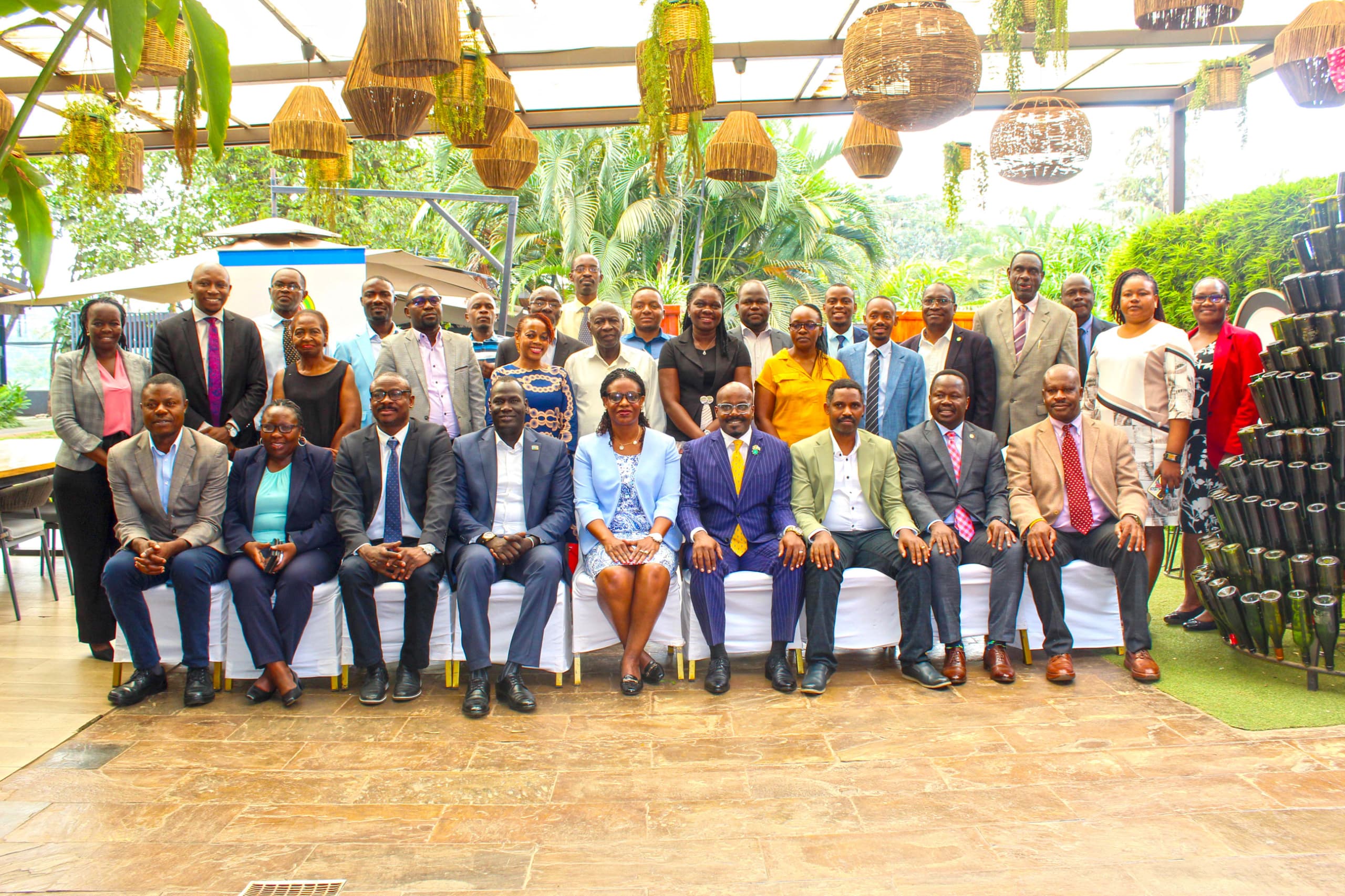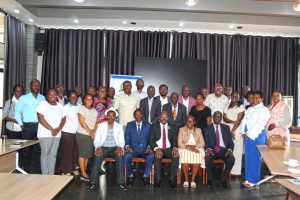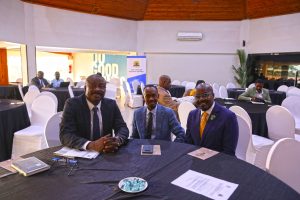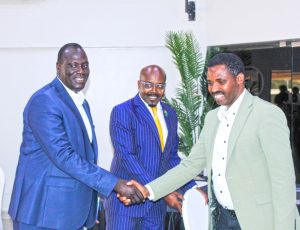Kampala, Uganda, Saturday 9th August 2025 – The East African Business Council (EABC), in partnership with the Private Sector Foundation Uganda (PSFU) and the Uganda Manufacturers Association (UMA), successfully convened the EABC CEOs – EAC Secretariat Consultative Meeting from 7–8 August 2025 in Kampala, Uganda.
The two-day meeting brought together 55 representatives from Uganda’s public and private sectors to discuss solutions to barriers to trade and investment, aiming to boost the uptake of regional integration opportunities.
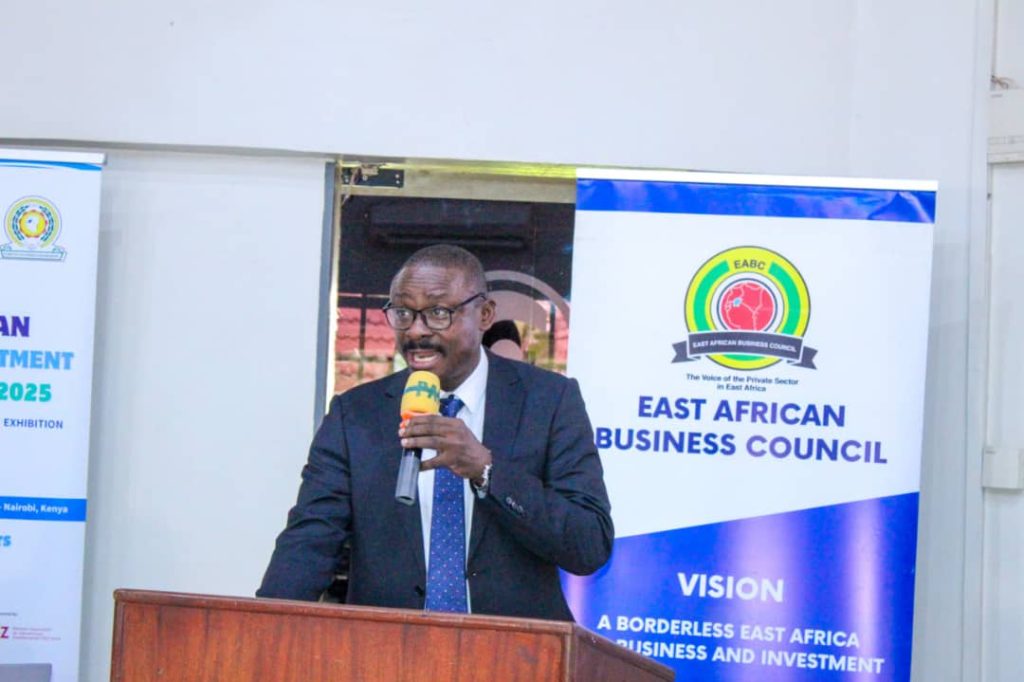 In his opening remarks, Mr. Adrian Njau, Acting Executive Director of the EABC, underscored the urgency of deepening regional integration to meet the EAC’s intra-regional trade target of 40% by 2030. He noted that intra-EAC trade expanded by 2.35% in 2024 to reach USD 15.2 billion, yet it accounts for only 10.8% of total trade. He emphasized that achieving the 40% target by 2030 requires the private sector to lead a strong, evidence-based advocacy agenda and push for full implementation of EAC commitments.
In his opening remarks, Mr. Adrian Njau, Acting Executive Director of the EABC, underscored the urgency of deepening regional integration to meet the EAC’s intra-regional trade target of 40% by 2030. He noted that intra-EAC trade expanded by 2.35% in 2024 to reach USD 15.2 billion, yet it accounts for only 10.8% of total trade. He emphasized that achieving the 40% target by 2030 requires the private sector to lead a strong, evidence-based advocacy agenda and push for full implementation of EAC commitments.
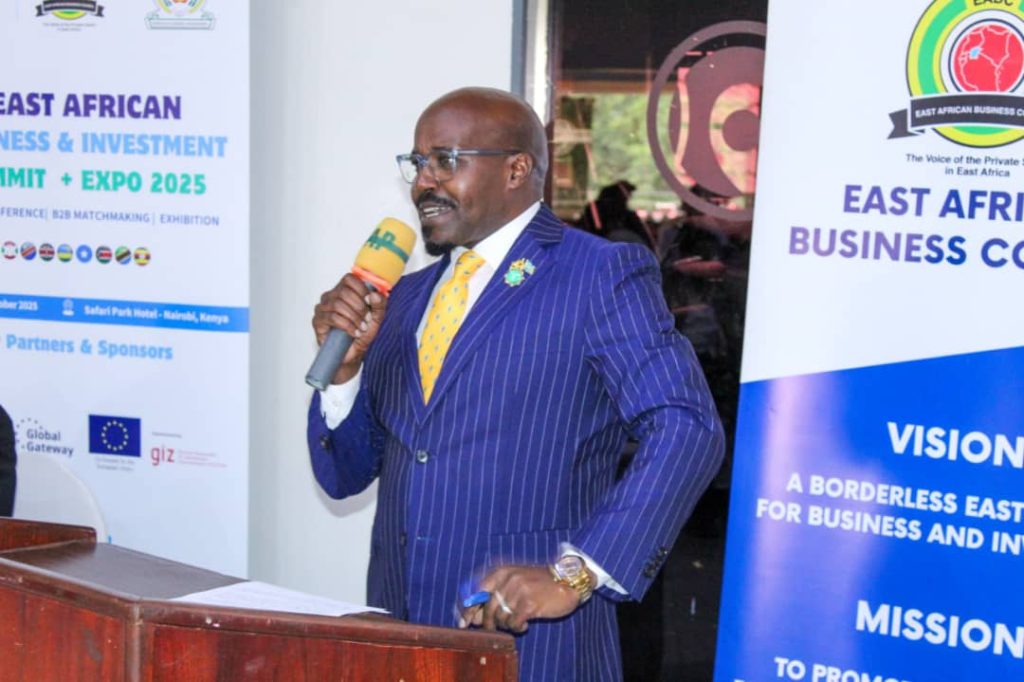 Mr. Oscar Kamukama, EABC Governing Council Member, stated that Uganda is a cornerstone of the EAC regional agenda, with a robust trade surplus of USD 206 million with Partner States, GDP growth of 5.1%, and 39% of the region’s FDI inflows. He said that as a region, there is a need to leverage opportunities in manufacturing, agro-processing, ICT, e-mobility, and mineral beneficiation, while dismantling trade barriers.
Mr. Oscar Kamukama, EABC Governing Council Member, stated that Uganda is a cornerstone of the EAC regional agenda, with a robust trade surplus of USD 206 million with Partner States, GDP growth of 5.1%, and 39% of the region’s FDI inflows. He said that as a region, there is a need to leverage opportunities in manufacturing, agro-processing, ICT, e-mobility, and mineral beneficiation, while dismantling trade barriers.
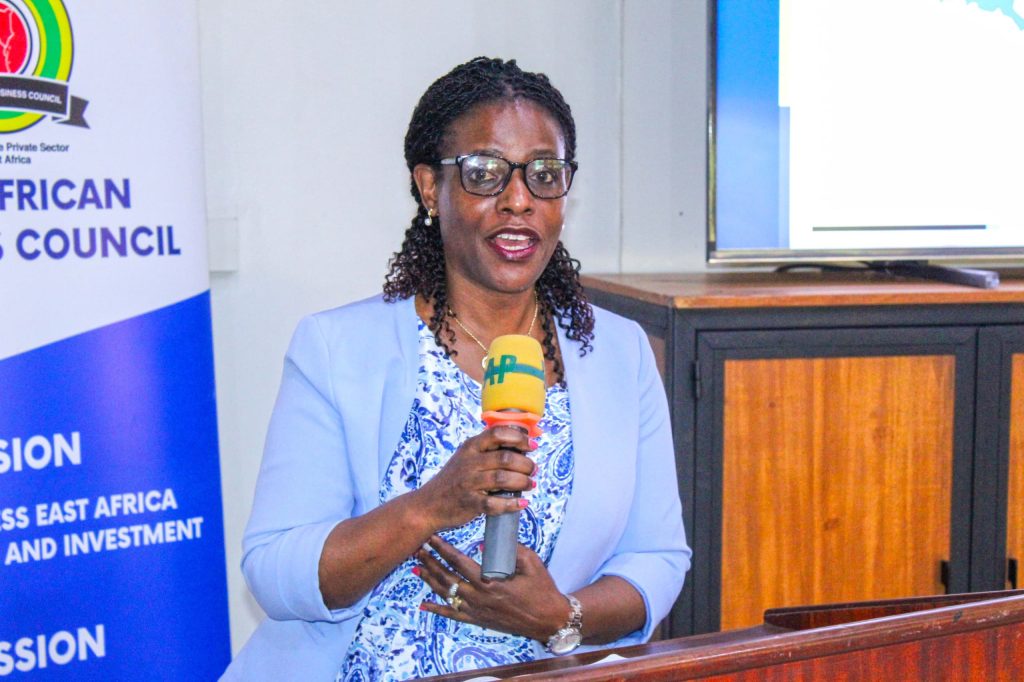 EAC Deputy Secretary General, Annette Mutaawe Ssemuwemba, highlighted that regional integration is progressing, with statistics showing that intra-EAC trade increased from USD 3.4 billion in 2024 to USD 5.2 billion in the first quarter of 2025. She noted that the EAC has successfully reduced reported NTBs from 140 to about 20 and recently launched the EAC Single Bond to simplify cargo movement and reduce costs. She emphasized the need for accelerated implementation of commitments, stronger coordination among Partner States, and the establishment of a Presidential Investors’ Roundtable at the regional level to elevate private sector priorities to Heads of State.
EAC Deputy Secretary General, Annette Mutaawe Ssemuwemba, highlighted that regional integration is progressing, with statistics showing that intra-EAC trade increased from USD 3.4 billion in 2024 to USD 5.2 billion in the first quarter of 2025. She noted that the EAC has successfully reduced reported NTBs from 140 to about 20 and recently launched the EAC Single Bond to simplify cargo movement and reduce costs. She emphasized the need for accelerated implementation of commitments, stronger coordination among Partner States, and the establishment of a Presidential Investors’ Roundtable at the regional level to elevate private sector priorities to Heads of State.
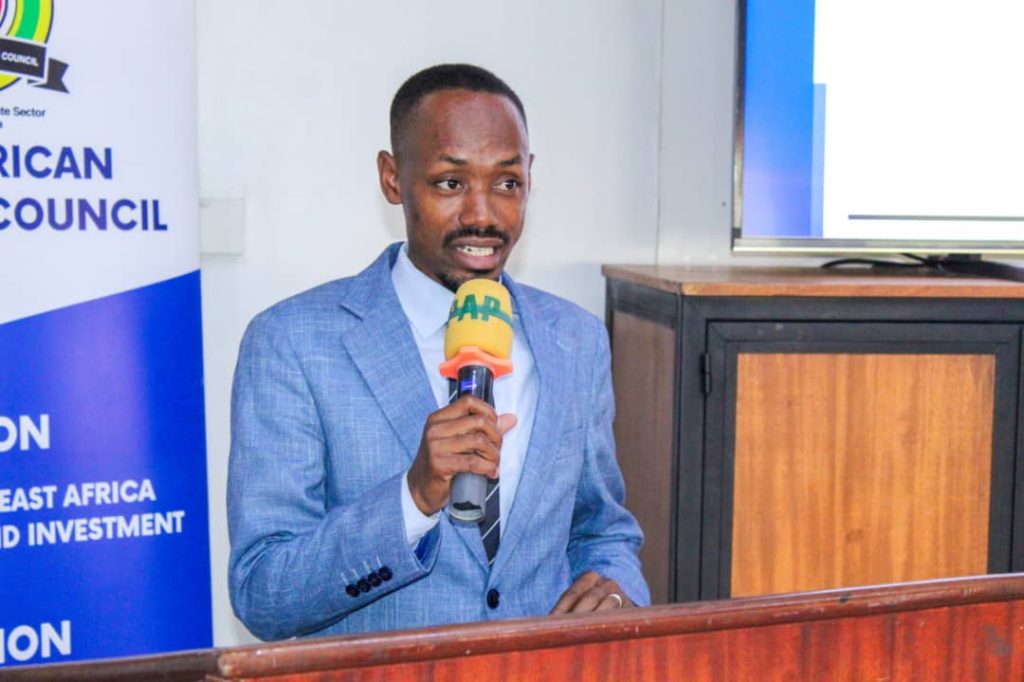 Dr. Julius Byaruhanga, Director of Policy Advocacy at PSFU, stressed the importance of a national private sector roadmap, noting that advocacy must be deliberate and aligned with both national and regional strategies to position Ugandan businesses competitively in the EAC market.
Dr. Julius Byaruhanga, Director of Policy Advocacy at PSFU, stressed the importance of a national private sector roadmap, noting that advocacy must be deliberate and aligned with both national and regional strategies to position Ugandan businesses competitively in the EAC market.
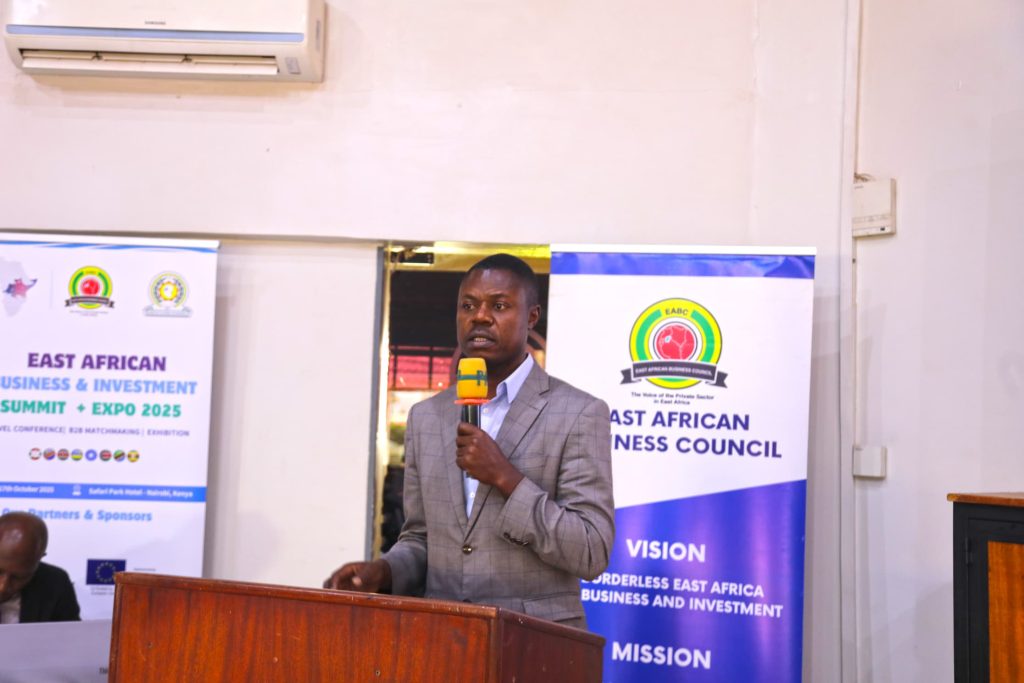 Mr. Lamech Wesonga, Economic and Policy Advisor on AfCFTA for EAC-GIZ, said that GIZ is committed to partnering with the private sector to drive regional and continental integration, noting that GIZ has worked with EABC to boost trade in services in the region.
Mr. Lamech Wesonga, Economic and Policy Advisor on AfCFTA for EAC-GIZ, said that GIZ is committed to partnering with the private sector to drive regional and continental integration, noting that GIZ has worked with EABC to boost trade in services in the region.
Dr. Byaruhanga also commended the Government of the Republic of Uganda under the leadership of H.E. President Yoweri Museveni for championing regional integration and refraining from imposing NTBs and restrictions on EAC counterpart countries. He stated that the meeting enables the private sector to chart a roadmap to better position Uganda’s businesses to benefit from regional integration opportunities. He acknowledged that challenges are multi-sectoral—political, regulatory, financial, and infrastructural—and said that the policy priorities charted by Uganda’s private sector will be presented to the EAC Secretariat for action.
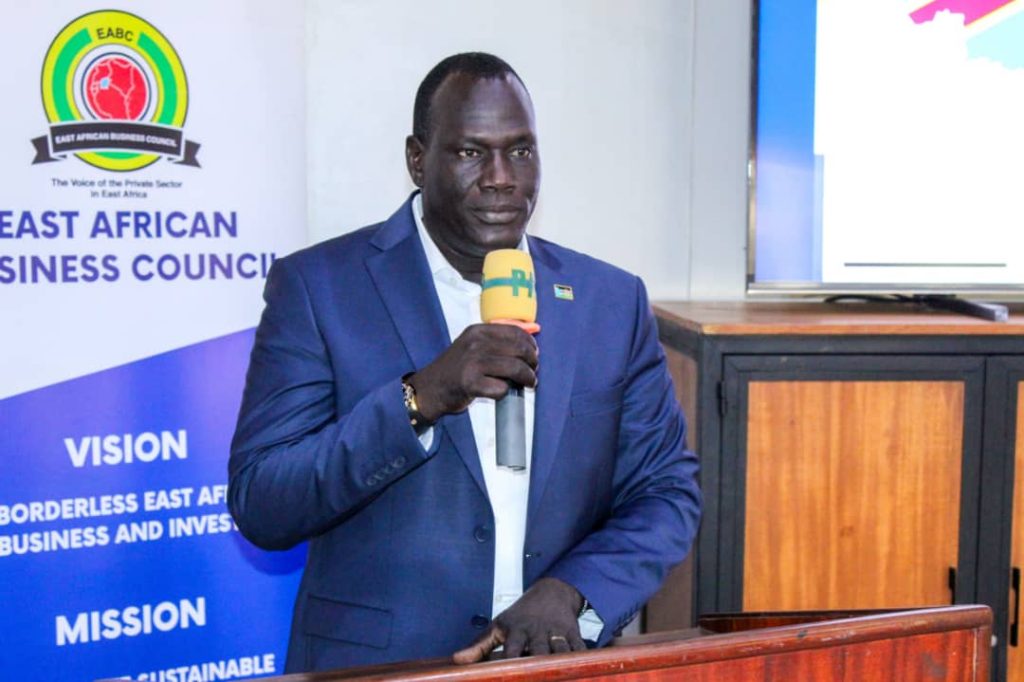 Hon. John Lual Akol, EABC Chairperson, emphasized the need to eliminate delays at border points, harmonize tax and trade regimes, and strengthen infrastructure to lower the cost of doing business in the region.
Hon. John Lual Akol, EABC Chairperson, emphasized the need to eliminate delays at border points, harmonize tax and trade regimes, and strengthen infrastructure to lower the cost of doing business in the region.
The Ambassador of Uganda to the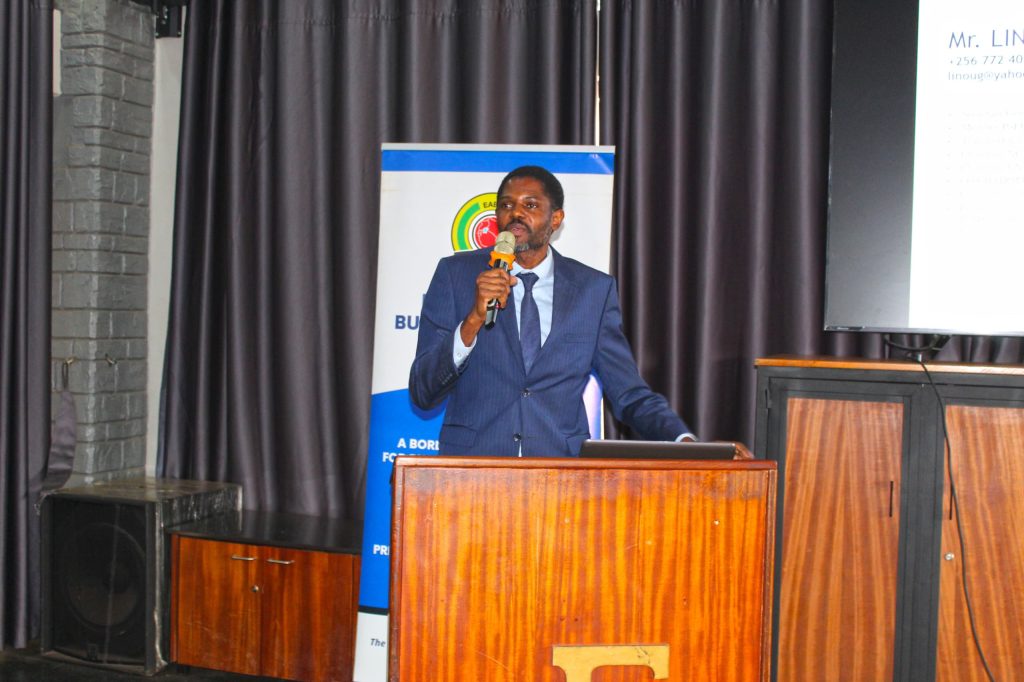 DRC, Aggrey Dhamuzungu, reaffirmed the Government’s commitment to establishing direct links between the private sector and diplomatic offices to boost economic ties.
DRC, Aggrey Dhamuzungu, reaffirmed the Government’s commitment to establishing direct links between the private sector and diplomatic offices to boost economic ties.
The discussions focused on agriculture, manufacturing, and services—including tourism, financial services, and logistics—while identifying priority policy actions to unlock growth.
In his pr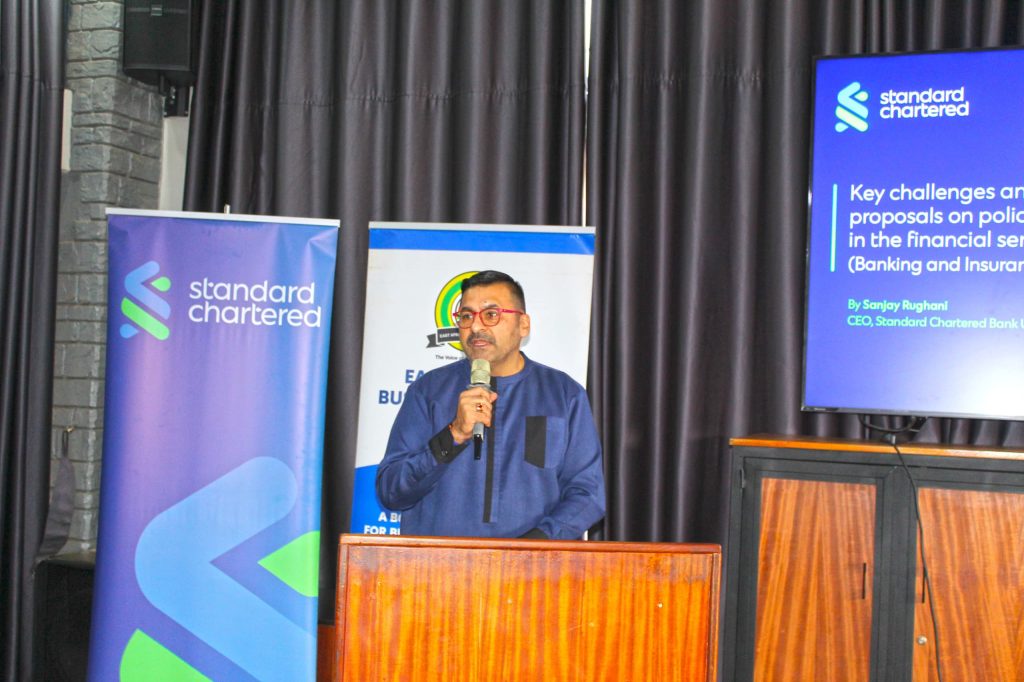 esentation, Mr. Sanjay Rughani, CEO of Standard Chartered Bank, called for the development of a regional digital financial strategy to enhance financial inclusion and cross-border transactions within the EAC.
esentation, Mr. Sanjay Rughani, CEO of Standard Chartered Bank, called for the development of a regional digital financial strategy to enhance financial inclusion and cross-border transactions within the EAC.
Mr. Ronald Kyagulanyi, Coordinator for Research, Policy, and Economic Analysis at the PSFU, outlined key tariff and non-tariff barriers (NTBs) faced by Ugandan businesses when exporting to the EAC, including inspection fees for wooden products, excise duties on eggs, fish, and ceramic tiles, unharmonized transit fees, and visa requirements imposed by the Democratic Republic of Congo (DRC) and South Sudan.
Ms. Harriet Kiiza, Principal Tourism Officer and certified hotel assessor at the Ministry of Tourism, Uganda, advocated for a common EAC grading system for tourism and hospitality and called on all Partner States to adopt the EAC Single Tourist Visa and liberalize tourism services across the region.
Mr. Ssekayiba Edward, Head of Programs and Partnerships at the Uganda Leather and Allied Industries Association, stressed the need for mutual recognition of standards for raw hides, wet blue, and finished leather, as well as for skills in leather processing, design, and technology.
Ms. Joan Asiimwe, Coordinator for Corporate Social Responsibility at the New Forest Company, recommended that the region adopt internationally recognized forestry standards, such as those of the Forest Stewardship Council (FSC), to distinguish sustainable from unsustainable forestry practices.
Ms. Victoria Ashabahebwa, Chairperson of the Uganda Tea Association, urged the harmonization of fees and charges on tea sold at the Mombasa Auction Mart to ensure fairness and competitiveness for Ugandan tea producers.
Ms. Prisca Beesigomwe, Head of Programs and Operations at HortiFresh, and Mr. Dixon Kyaba Tukam, Executive Director of the Cashew Farmers and Promoters National Association of Uganda Ltd, jointly called for the harmonization of Sanitary and Phytosanitary (SPS) measures and clearance procedures for cashew nut seeds traded between EAC Partner States.
Mr. Lino Criel Icila, Secretary General of the Uganda Warehouse Receipt System Authority, underscored the role of clearing and forwarding agents in facilitating trade and recommended adherence to EAC integration protocols, the introduction of weigh-in-motion systems, and the harmonization of taxes on imported trucks.
Mr. Simon Katembeko Kagumire, Principal Logistics Officer at the Ministry of Works and Transport, announced that the Government of Uganda has agreed to gazette and establish two more One-Stop Border Posts (OSBPs) at Mulwadda and Buteba as alternative routes to decongest the Malaba and Busia borders. He also noted plans to construct 1,700 kilometers of standard gauge railway from Malaba to Kampala, with branches connecting major industrial facilities. In addition, a trimodal port at Bukasa is being developed to connect cargo to Musoma and Mwanza in Tanzania and to Kisumu in Kenya. The East African Crude Oil Pipeline (EACOP) is expected to transport oil from the Lake Albert oil fields to the Port of Tanga in Tanzania and is set to be completed by June 2026.
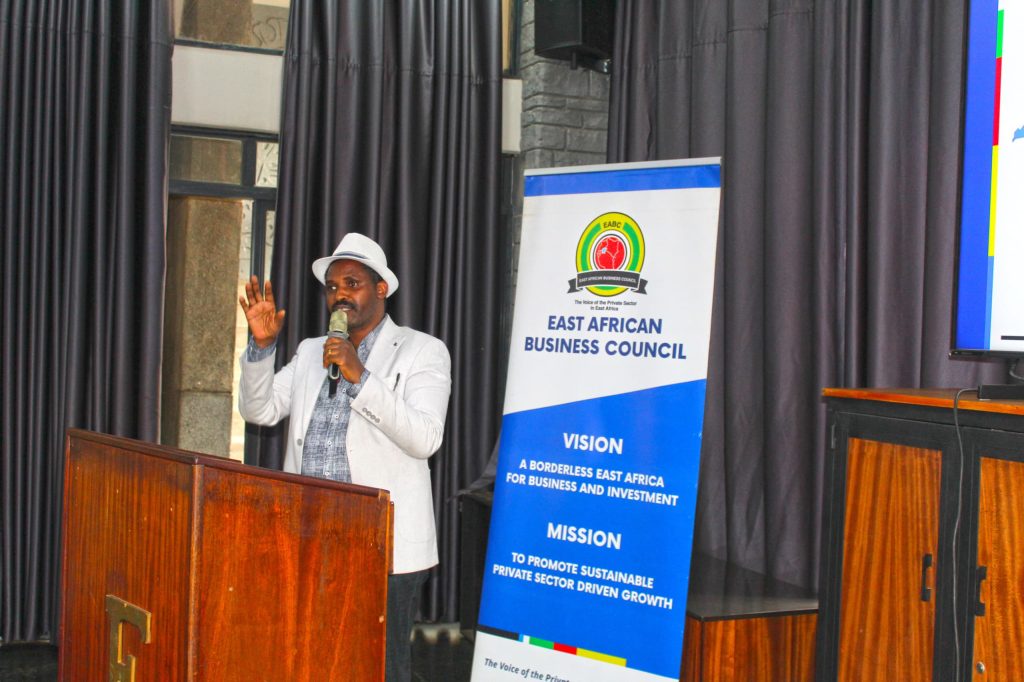 In his closing remarks, Mr. Bruce Mpamize, EABC Governing Council Member, called for adopting a unified regional economic mindset and promoting the “Buy East Africa, Build East Africa” campaign to position the EAC bloc on the global stage.
In his closing remarks, Mr. Bruce Mpamize, EABC Governing Council Member, called for adopting a unified regional economic mindset and promoting the “Buy East Africa, Build East Africa” campaign to position the EAC bloc on the global stage.
The meeting outlined key policy recommendations, including the uniform application of the EAC Common External Tariff (2022), elimination of non-tariff barriers, review of the EAC Rules of Origin, free movement of workers, liberalization of air transport and trade in services, harmonization of domestic taxes, and leveraging high-level platforms such as the Presidential Investors’ Roundtable to resolve business constraints.

